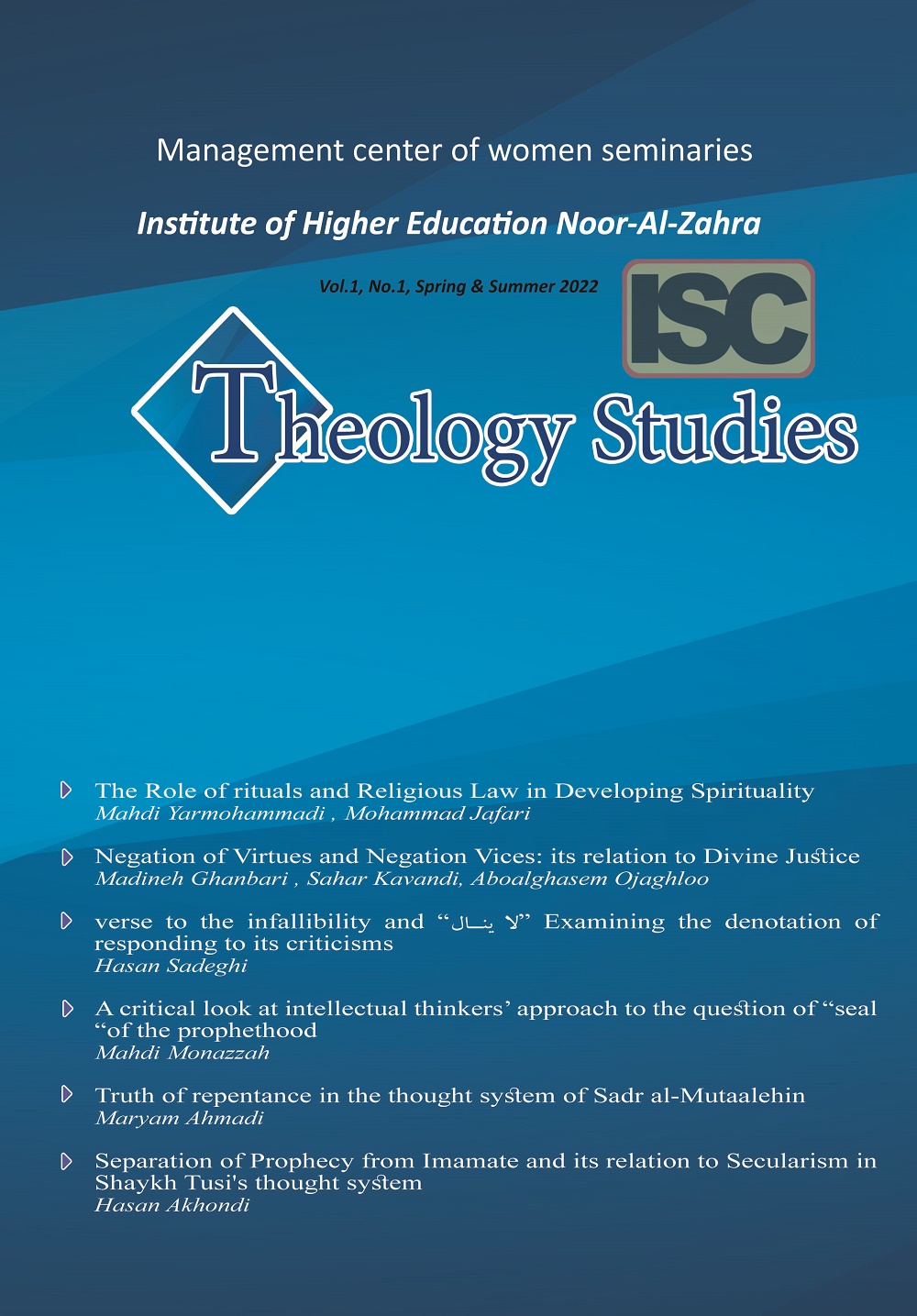Cancellation and compensation: its relation to Divine Justice
Document Type : Original Article
Authors
1 کارشناسی ارشد فلسفه و کلام اسلامی، دانشگاه زنجان
2 دانشیار گروه فلسفه، دانشگاه زنجان
3 استادیار گروه معارف، دانشگاه زنجان
Abstract
The cancellation and compensation, and in case of the possibility of occurrence, its relation to divine justice are among the challenging issues in Islamic Theology. The views and perspectives of Mu’tazilite, Ash’ari, and Shi’i theologians vary greatly on the contingency or non-contingency of cancellation and compensation and reckoning of deeds. Mu’tazilites acknowledge the cancellation and compensation in its absolute and balanced form and have referred to the rational arguments and revealed arguments. On the contrary, Ash’arites and Imamiyya theologians with reference to the rational and revealed arguments have attempted to refute Mu’tazilites’ proposition and substantiate their viewpoint. However, the matter of contention is that in light of some verses in Quran indicating the occurrence of cancellation and compensation, in addition to the verses emphasizing the precise retribution of every deed, how can the compatibility of cancellation and compensation with divine justice be interpreted, justified and clarified? By elucidating the viewpoints and arguments of theologians about the occurrence or non-occurrence of cancellation and compensation, the current article is aimed at examining its relation with divine justice.
Keywords
- ابن منظور الأنصاری، محمد بن مکرم، 1414ق، لسان العرب، بیروت: انتشارات دار الفکر- دار صادر.
- ایجی، میر سید شریف، 1325ق، شرح المواقف، قم: انتشارات الشرف الرضی،ج4-7-8.
- آمدی، سیف الدین، 1423ق، أبکار الأفکار فی أصول الدین، قاهره:انتشارات دار الکتب.
- بحرانی، ابن میثم،1406ق، قوائد المرام فی علم الکلام، مطبعة مهر قم.
- تفتازانی، سعدالدین، 1409ق، شرح المقاصد، قم: انتشارات الشریف الرضی، ج4-5.
- جزری، ابن اثیر، 1367ش، النهایه فی غریب الحدیث و الأثر، قم: انتشارات موسسه مطبوعاتی اسماعلیلیان.
- جوینی، عبدالملک بن عبدالله، 1416ق، الإرشاد الی قواطع الأدله فی أول الإعتقاد، بیروت: انتشارات دار الکتب العلمیه.
- حسینی زبیدی، محمد بن عبدالرزاق المرتضی، 1414ق، تاج العروس من جواهر القاموس، بیروت انتشارات دارالفکر.
- حلی، علامه حسن بن یوسف، 1363ش، أنوار الملکوت فی شرح الیاقوت، قم: انتشارات الشریف الرضی.
- ----- ، 1426ق، تسلیک النفس إلی حظیره القدس، قم: انتشارات مؤسسه الإمام الصادق (ع).
- ----- ، 1413ق، کشف المراد فی شرح تجریدالإعتقاد، قم: انتشارات موسسه النشر الإسلامی.
- حمصی رازی، سدید الدین، 1412ق، المنقذ من التقلید، قم انتشارات موسسه النشر الاسلامی.
خرازی، محسن، 1315، شرح بدایه المعارف، قم: انتشارات آیت اشراق.
- رازی، فخرالدین ابوعبدالله محمد بن عمر، 1420ق، مفاتیح الغیب، بیروت: انتشارات دار احیاء التراث العربی.
- رازی، سدیدالدین محصی، 1414ق، المنقذ من التقلید، قم، مؤسسه النشر الإسلامی، ج2.
- راغب اصفهانی، ابوالقاسم حسین بن محمد، 1383ش، لغت نامه راغب اصفهانی، ترجمه غلامرضا خسروی حسینی.
- ----- ، 1412ق، المفردات فی غریب القرآن، دار العلم الدار الشامیه.
- سید مرتضی( علم الهدی)، ابوالقاسم علی بن حسین بن موسی، 1411ق، الذخیره فی علم الکلام، قم: انتشارات موسسه النشر الإسلامی.
- شبر، سید عبدالله، 1424ق، حق الیقین فی معرفه أصول الدین، قم: انتشارات أنوار الهدی.
شعرانی ابوالحسن، 1393ق، شرح فارسی تجرید الاعتقاد، تهران: انتشارات اسلامیه.
- شیخ طوسی، ابو جعفر محمد بن حسن، 1406ق، الاقتصاد فیما یتعلق بالإعتقاد، بیروت: دارالأضواء، چاپ دوم.
- ----- ، 1358ش، تمهید الاصول فی علم الکلام، به کوشش عبدالمحسن مشکاه الدینی، تهران: انجمن اسلامی حکمت و فلسفه ایران.
- طباطبایی، سید محمد حسین، 1374ش، المیزان فی تفسیر القرآن، قم: انتشارات اسلامی جامعهی مدرسین حوزه علمیه قم.
- طوسی، خواجه نصیرالدین ابو جعفر محمد بن محمد بن حسن، 1407ق، تجرید الاعتقاد، قم: انتشارات دفتر تبلیغات اسلامی.
- طریحی، الشیخ فخر الدین، 1408ق، مجمع البحرین، مکتب نشر:الشقافه الإسلامیه.
- فاضل مقداد، ابوعبدالله مقداد بن عبدالله، 1405ق، إرشاد الطالبین إلی نهج المسترشدین، قم: انتشارات کتابخانه آیت الله مرعشی.
- -----، 1422ق، اللوامع الإلهیه فی المباحث الکلامیه، قم: انتشارات دفتر تبلیغات اسلامی.
- قرشی، سید علی اکبر، 1371ش، قاموس قرآن، دار الکتب الإسلامیه، تهران، چاپ ششم.
- کلینی، محمد بن یعقوب، 1383ش، الکافی، تهران: دارالکتب الاسلامیة.
- لاهیجی، عبدالرزاق بن علی فیاض، 1362، سرمایه ایمان در اصول اعتقادات، تهران: انتشارات الزهراء،.چاپ سوم.
- مجلسی، محمد باقر، 1404ق، بحارالأنوار الجامعه لدرر أخبار الأئمه الأطهار، بیروت: موسسه الوفاء.
- مصطفوی، حسن، 1360، التحقیق فی کلمات القرآن الکریم، انتشارات: بنگاه ترجمه و نشر کتاب، تهران.
- معرفت، محمدهادی، 1388، التمهید فی علوم القرآن، قم: موسسه فرهنگی انتشاراتی التمهید، ج3.
- مکدرموت، مارتین، 1372، اندیشه های کلامی شیخ مفید، ترجمه احمد آرام، تهران: انتشارات دانشگاه تهران.
- مفید، محمد بن محمد بن نعمان(شیخ مفید)، 1414ق، النکت الإعتقادیة، دارالمفید.
- ملاصدرا، محمد بن ابراهیم( صدرالدین شیرازی)، 1360ش، الشواهد الربوبیة فی المناهج السلوکیة، تعلیق و تصحیح و مقدمه سید جلال الدین آشتیانی، مشهد: مرکز نشر دانشگاهی.
- مفید، محمد بن نعمان( شیخ مفید)، 1413، أوائل المقالات فی المذاهب و المختارات، قم: انتشارات الموتمر العالمی للشیخ المفید، ج2.
- همدانی، عبدالجبار بن احمد، 1422ق، شرح الاصول الخمسه، بیروت: انتشارات دار احیاء التراث العربی، ج4.
Volume 1, Issue 1 - Serial Number 1
August 2022Pages 29-52
- Receive Date: 04 February 2022
- Revise Date: 11 May 2022
- Accept Date: 12 June 2022
- First Publish Date: 23 August 2022
